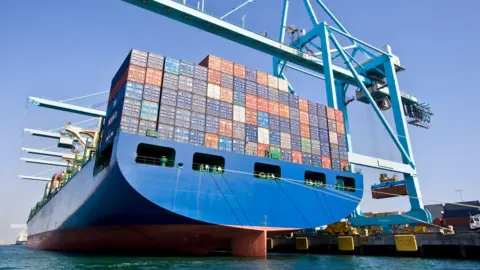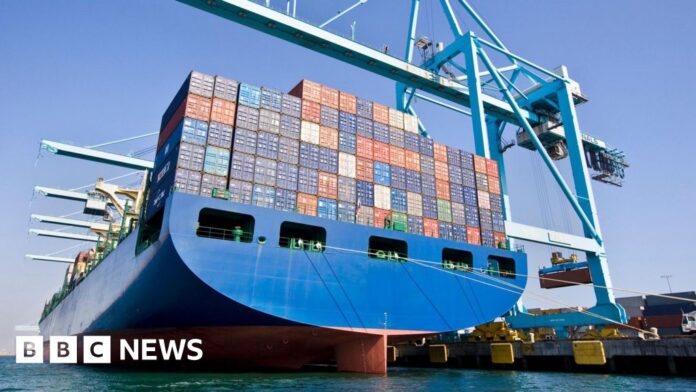Business reporter, BBC News
 Getty Images
Getty ImagesThe US and China have agreed a truce to lower import taxes on goods being traded between the two countries.
The agreement marks a major de-escalation of the trade war between the world’s two biggest economies, which has sent shockwaves impacting countless other countries, including the UK.
Here’s what it all means.
What has been announced?
Both the US and China have confirmed a reduction in the tariffs they imposed on each other following the initial escalation by President Donald Trump earlier this year.
The deal involves both nations cancelling some tariffs altogether and suspending others for 90 days, by 14 May.
The result is that US tariffs on Chinese imports will fall to from 145% to 30%, while Chinese tariffs on some US imports will fall from 125% to 10%.
China has also halted and scrapped other non-tariff countermeasures, such as the export of critical minerals to the US, which it put in place in response to the initial escalation.
The US measures still include an extra 20% component aimed at putting pressure on Beijing to do more to curb the illegal trade in fentanyl, a powerful opioid drug.
The announcement came after the two countries held talks in Switzerland, the first between the two countries since Trump sparked the latest tariff war.
What happens after 90 days?
Trying to predict the next steps in this ongoing trade war between the US and China these past few months has been difficult to say the least.
But this is a major agreement between the world’s two powerhouse economies and has been broadly welcomed.
Even if the suspended tariffs are reinstated after 90 days, because the vast majority of the tariffs that were announced after Liberation Day have been cancelled, US tariffs on China would only rise to 54% and Chinese tariffs on the US would rise to 34%.
However, talks between both governments are set to continue, so a further deal might be struck.
US Treasury Secretary Scott Bessent said the consensus from both countries was that “neither side wants a decoupling”, while China’s commerce ministry said the agreement was a step to “lay the foundation to bridge differences and deepen co-operation”.
So relations between the US and China are sounding more friendly, but as we’ve seen so far during this Trump presidency, things can change quickly.
What goods do the US and China trade with each other?
In a word – lots.
In 2024, the biggest category of goods exported from the US to China were soybeans – primarily used to feed China’s estimated 440 million pigs. The US also sent pharmaceuticals and petroleum.
Meanwhile, China exported large volumes of electronics, computers and toys.
The biggest category of US imports from China is smartphones, accounting for 9% of the total. A large proportion of these smartphones Apple iPhones made in China.
However, the US buys much more from China ($440bn) than it sells to it ($145bn), which is something Trump has long been unhappy with.
His reasoning in part for introducing tariffs, and higher ones on countries which sell more to the US than they buy, is to encourage US consumers to buy more American-made goods, increase the amount of tax raised and boost manufacturing jobs.
The escalating trade war in recent months has led to a collapse in the amount of goods being shipped across the Pacific Ocean, but investors believe the truce will lead to a rebound, with shares up for some of the world’s biggest shipping firms.
Has either side won?
Politicians on both sides have started and will no doubt continue to claim victory over this truce.
Despite the US and China calling this a joint agreement, people in Beijing will interpret it as the Trump administration walking back from the tariffs, according to Janka Oertel, director of the Asia programme at the European Council on Foreign Relations.
“We are back to square one, now negotiating can begin. The outcome is uncertain but China is in a psychologically stronger position now than before,” she said.
The US will argue its tariff rate on Chinese imports, although lower, is still hefty at 30%.
“This trade deal is a win for the United States, demonstrating President Trump’s unparalleled expertise in securing deals that benefit the American people,” a White House statement said.
Economists at Deutsche Bank have suggested the lowering of tariffs, and last week’s UK-US deal on them, means there’s both “a likely cap and floor” to Trump’s rates.
“The UK has one of the least imbalanced relationships with the US and now has a universal tariff rate of 10%. China has one of the most imbalanced relationships and now has a tariff rate of 30%,” said George Saravelos, head of FX research at the investment bank.
“It is reasonable that these two numbers now set the bounds of where American tariffs will end up this year.”

